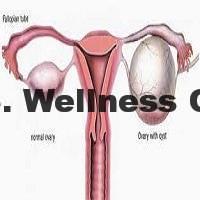REVEALED!!!
13 Must Known Facts About Ovarian Cysts and its natural treatment.
Welcome to ovarian cysts clinic, where you will get A-Z information about Ovarian cysts and well as the natural cure.
At our wellness Center we understand women and their gynacological problem perfectly well such as Ovarian Cyst, Fibroids, menstruation problem, Endometriosis, Hormonal imbalance, PCOS, Infection, Infertility etc.
Ovarian cysts are fluid-filled sacs in the ovary. They are common and usually form during ovulation. Ovulation happens when the ovary releases an egg each month. Many women with ovarian cysts don’t have symptoms. The cysts are usually harmless.
What are ovarian cysts?
A cyst is a fluid-filled sac. It can form in many places in the body. Ovarian cysts form in or on the ovaries.
What are the different types of ovarian cysts?
The two most common types of cysts are:
1.Follicle cysts. In a normal menstrual cycle, the ovaries release an egg each month. The egg grows inside a tiny sac called a follicle. When the egg matures, the follicle breaks open to release the egg. Follicle cysts form when the follicle doesn’t break open to release the egg. This causes the follicle to continue growing into a cyst. Follicle cysts often have no symptoms and go away in one to three months.
2.Corpus luteum cysts. Once the follicle breaks open and releases the egg, the empty follicle sac shrinks into a mass of cells called corpus luteum. Corpus luteum makes hormones to prepare for the next egg for the next menstrual cycle. Corpus luteum cysts form if the sac doesn’t shrink. Instead, the sac reseals itself after the egg is released, and then fluid builds up inside. Most corpus luteum cysts go away after a few weeks. But, they can grow to almost four inches wide. They also may bleed or twist the ovary and cause pain. Some medicines used to cause ovulation can raise the risk of getting these cysts.
Other types of benign ovarian cysts are less common:
1.Endometriomas are caused by endometriosis. Endometriosis happens when the lining of the uterus (womb) grows outside of the uterus.
2.Dermoids come from cells present from birth and do not usually cause symptoms.
3.Cystadenomas are filled with watery fluid and can sometimes grow large.
4.In some women, the ovaries make many small cysts. This is called polycystic ovary syndrome (PCOS). PCOS can cause problems with the ovaries and with getting pregnant.
5.Malignant (cancerous) cysts are rare. They are more common in older women. Cancerous cysts are ovarian cancer. For this reason, ovarian cysts should be checked by your doctor. Most ovarian cysts are not cancerous.
Who gets ovarian cysts?
Ovarian cysts are common in women with regular periods. In fact, most women make at least one follicle or corpus luteum cyst every month. You may not be aware that you have a cyst unless there is a problem that causes the cyst to grow or if multiple cysts form. About 8% of premenopausal women develop large cysts that need treatment.
Ovarian cysts are less common after menopause. Postmenopausal women with ovarian cysts are at higher risk for ovarian cancer.
What are the symptoms of Ovarian cyst
It includes bloating, needing to urinate more often, pelvic pressure or pain, or abnormal (unusual) vaginal bleeding. These can be signs of a cyst or other serious problem.
What causes ovarian cysts?
The most common causes of ovarian cysts include:
1.Hormonal problems. Functional cysts usually go away on their own without treatment. They may be caused by hormonal problems or by drugs used to help you ovulate.
2.Endometriosis. Women with endometriosis can develop a type of ovarian cyst called an endometrioma.
3.The endometriosis tissue may attach to the ovary and form a growth. These cysts can be painful during sex and during your period.
4.Pregnancy. An ovarian cyst normally develops in early pregnancy to help support the pregnancy until the placenta forms. Sometimes, the cyst stays on the ovary until later in the pregnancy and may need to be removed.
5.Severe pelvic infections. Infections can spread to the ovaries and fallopian tubes and cause cysts to form.
What are other signs and symptoms of ovarian cysts?
Most ovarian cysts are small and don’t cause symptoms.
If a cyst does cause symptoms, you may have pressure, bloating, swelling, or pain in the lower abdomen on the side of the cyst. This pain may be sharp or dull and may come and go.
If a cyst ruptures, it can cause sudden, severe pain.
If a cyst causes twisting of an ovary, you may have pain along with nausea and vomiting.
Less common symptoms include:
1.Pelvic pain.
2.Dull ache in the lower back and thighs
3.Problems emptying the bladder or bowel completely
4.Pain during sex
5.Unexplained weight gain
6.Pain during your period
7.Unusual (not normal) vaginal bleeding
8.Breast tenderness
9.Needing to urinate more often
How are ovarian cysts found?
Tests includes:
1.Ultrasound. This test uses sound waves to create images of the body. With ultrasound, it shows the cyst’s: The Shape, Size, Location, Mass (whether it is fluid-filled, solid, or mixed).
2.Pregnancy test to rule out pregnancy.
3.Hormone level tests to see if there are hormone-related problems.
4.In premenopausal women, many other illnesses or diseases besides cancer can cause higher levels of CA-125.
Are ovarian cysts ever an emergency?
Yes, sometimes. If your doctor told you that you have an ovarian cyst and you have any of the following symptoms, get medical help right away:
Pain with fever and vomiting
Sudden, severe abdominal pain
Faintness, dizziness, or weakness
Rapid breathing
These symptoms could mean that your cyst has broken open, or ruptured.
Sometimes, large, ruptured cysts can cause heavy bleeding.
Can ovarian cysts lead to cancer?
Yes, some ovarian cysts can become cancerous. But most ovarian cysts are not cancerous.
The risk for ovarian cancer increases as you get older. Women who are past menopause with ovarian cysts have a higher risk for ovarian cancer. Talk to your doctor about your risk for ovarian cancer. Screening for ovarian cancer is not recommended for most women.3 This is because testing can lead to “false positives.” A false positive is a test result that says a woman has ovarian cancer when she does not.
Can ovarian cysts make it harder to get pregnant?
Typically, no. Most ovarian cysts do not affect your chances of getting pregnant. Sometimes, though, the illness causing the cyst can make it harder to get pregnant. Two conditions that cause ovarian cysts and affect fertility are:
1.Endometriosis, which happens when the lining of the uterus (womb) grows outside of the uterus. Cysts caused by endometriosis are called endometriomas.
2.Polycystic ovary syndrome (PCOS), one of the leading causes of infertility (problems getting pregnant). Women with PCOS often have many small cysts on their ovaries.
How do ovarian cysts affect pregnancy?
Ovarian cysts are common during pregnancy. Typically, these cysts are benign (not cancerous) and harmless. Ovarian cysts that continue to grow during pregnancy can rupture or twist or cause problems during childbirth.
Surgery is not the best option for Ovarian Cyst.
This is because after surgery there is chance of adhesion which is the serious pain people experience after surgery.
NATURAL TREATMENT FOR OVARIAN CYSTS
Click here to see the detail of our Ovarian Cysts Natural Treatment.
OUR ADDRESS:
3rd Floor, 473, Lagos-Abeokuta Express Way, Old UBA Building Beside NNPC,, U-turn Bus Stop, Abule Egba, Lagos, Nigeria.
Mon – Friday (9.00 a.m. – 5.00 p.m.) Nigerian Time
Saturday (10.00 a.m. – 2.00 p.m.) Nigerian Time
Our Office is Close on Sunday but you can Whatsapp, Call, Email Us.
WHATSAPP: (+234)-8038690104
CALL: 08038690104 OR +234-8038690104
EMAIL: [email protected]
At I. A. & S. Wellness Centre, we have well trained staff members to guide you.
We are:
- Member National Association of Nigeria Traditional Medicine Practitioners (NANTMP),
- Member Association of Commonwealth Traditional Medicines Practitioners for West Africa
- We also have trained Acupunturists and TCM experts
OTHER TREATMENT WE OFFER:
The following are some of the treatments we offer Alphabetically (A-Z):
- Abdominal pain Natural treatment
- Abnormal Vaginal bleeding Natural treatment
- Acquired Immunodeficiency Syndrome(AIDS) natural treatment
- Adhesion natural treatment
- Amenorrhea Natural treatment
- Anemia natural treatment
- Arteriosclerosis and Atherosclerosis Natural treatment
- Appendicitis Natural treatment without surgery
- Asthma Natural treatment
- Candidiasis Natural treatment
- Cancer Natural treatment
- Cervical Polyps Natural treatment
- Cholesterol Natural treatment
- Chlamydia Infection Natural treatment
- Fibroids Natural Treatment (without surgery)
- Female Infertility Natural treatment
- Fibrocystic Breast Natural Treatment
- Male infertility Natural treatment
- Menopause Natural treatment
- Mouth odor and Cancer Natural treatment
Was this article helpful? “Facts About Ovarian Cysts”
PLEASE SHARE “Facts About Ovarian Cysts”


